Resources
19 May 2024
6:30pm
Jesus' coming Kingdom
A friend of mine graduated in engineering and landed a first job with Ford. And on day one he was told he was joining a team designing a new car which was crucial to Ford’s future – something called the Focus. And he was taken into this room and told ‘Here it is’ and there on the table was a 1:4 scale model in clay – not actually a Ford Focus, but a model to give everyone an idea of what was coming. And that’s why King David and his kingdom was part of God’s plan. He was a model to give everyone an idea of what was coming in Jesus. So before the last in this series on David, let’s pray:
Father,Please help us to understand David and his kingdom better, so that we can understand Jesus and his kingdom better.In Jesus’ name. Amen
So I know Bible graphics are on the screens, but I’d encourage you to open a Bible, and we’re starting on page 258 in 2 Samuel 5, where we began this series. And as we end it tonight, we’ll try to pull things together. So, look at these pictures:

We’re in the Old Testament. That’s the part of the Bible written before Jesus, which pointed forward to Jesus. And it was to show us: why we need Jesus, and what he was coming to do.
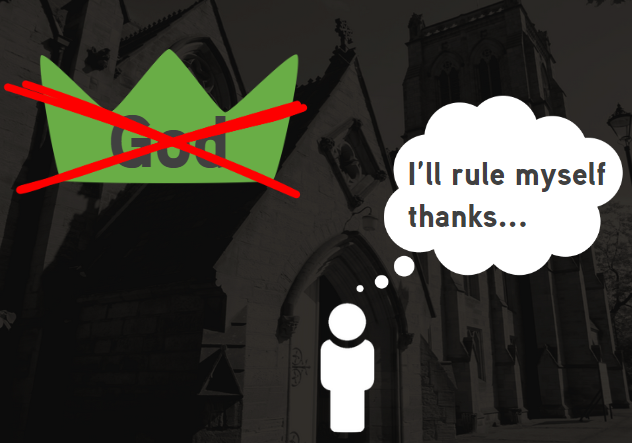
So why we need Jesus is that…starting with the first man and woman, all human beings have wanted to rule their own lives, rather than let God rule them. So I once asked someone ‘What’s your main objection to Christianity?’ and he said ‘The idea of someone else telling me how to live my life’. And that attitude is offensive to God and brings us under his judgement.
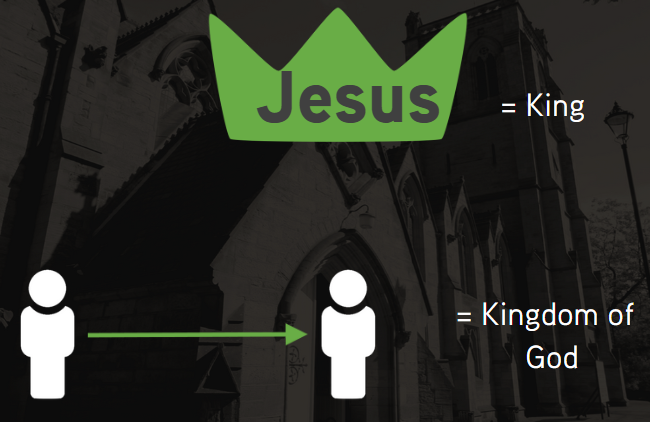
So Jesus came to…bring people back under God’s rule. So he’s the King with a capital ‘K’. And where people say to him ‘I want you to be my King’, the Bible says they’re in the kingdom of God. The question is: what kind of King and kingdom are we talking about? Because think of Charles and he’s a basically powerless constitutional monarch. But Jesus isn’t like that. So then think of the king of Saudi, and he has absolute power – and as the quote says ‘power corrupts and absolute power corrupts absolutely.’ But Jesus isn’t like that, either. So God created David’s kingdom as a model of what Jesus and his kingdom would be like. It was an imperfect model – like a 1:4 scale car in clay. But it helps us understand Jesus. So heading 1:
1. The model king
We’re on page 258, 2 Samuel 5 and look down to 2 Samuel 5.12 – half way down the left hand column:
And David knew that the Lord [God] had established him king over Israel, and that he had exalted his kingdom for the sake of his people Israel.
Which was utterly radical because any king would have said ‘Being king means I can take from my people – they serve me’. Whereas God’s king was for the sake of his people – he was to serve them because he modelled the King who would one day say (Mark 10.45):
For even [I] came not to be served but to serve, and to give [my] life as a ransom for many.
Turn on to 2 Samuel 8.15 and it says:
So David reigned over all Israel. And David administered justice
And that’s because he was ruling under God and for God. Just look on the screens at what God had said in his law about the time when Israel would have a king (Deuteronomy 17.18-19):
And when he [that’s the king] sits on the throne of his kingdom, he shall write for himself in a book a copy of this law…And it shall be with him, and he shall read in it all the days of his life, that he may learn to fear the Lord his God by keeping all the words of this law and these statutes, and doing them
So obeying God’s Word was the number one requirement for God’s king, because leading his people to obey God was his number one job.
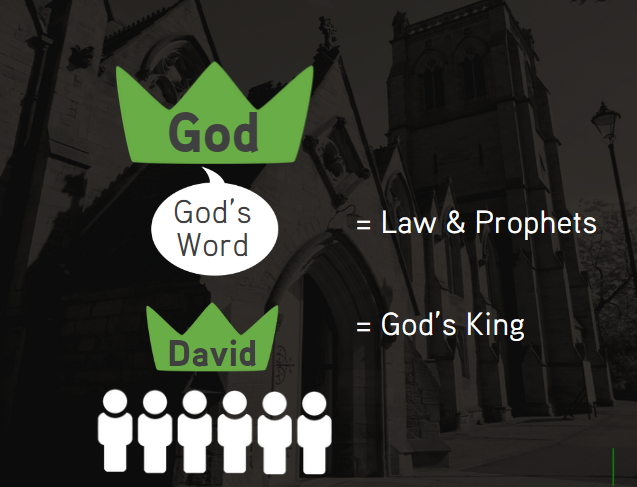
So here’s the picture of how the model kingdom was meant to be: God is the King with a capital K. And he speaks through his law and his prophets. And God’s king is meant to lead the people to trust and obey God’s Word. And where that’s happening (albeit imperfectly) you have a model of Jesus’ kingdom – albeit in imperfect, sinful human clay. And last week, we so how horribly imperfect it could be. So:
2. The failed king
Turn on to 2 Samuel 11.26. David has just led/forced Bathsheba into adultery, got her pregnant, and then got her husband killed to try cover up. And 2 Samuel 11.26-27:
When the wife of Uriah heard that Uriah her husband was dead, she lamented over her husband. And when the mourning was over, David sent and brought her to his house, and she became his wife and bore him a son…
So it looked like the cover-up had worked and that David could just carry on as before. But (end of 2 Samuel 11.27):
…the thing that David had done displeased the Lord [literally, ‘was evil in the LORD’s sight’].
And the LORD then swings into action to convict David of what he’s done.
Because David can’t just carry on as before – because he’s not who he was before. Before this, he was (albeit imperfectly) trying to trust and obey God. But now, for nine months plus, he’s been rationalising sin away until he can no longer see what is sin and what isn’t. So do you really think he’s been praying with any sincerity in that time, or reading God’s Word, or leading his people with any insight or integrity? No. He’s way off track with God. So God sends him the prophet Nathan to get him back on track. Look on to 2 Samuel 12.1-7:
And the Lord sent Nathan to David. He came to him and said to him, “There were two men in a certain city, one rich and the other poor. The rich man had very many flocks and herds, but the poor man had nothing but one little ewe lamb, which he had bought. And he brought it up, and it grew up with him and with his children. It used to eat of his morsel and drink from his cup and lie in his arms, and it was like a daughter to him. Now there came a traveller to the rich man, and he was unwilling to take one of his own flock or herd to prepare for the guest who had come to him, but he took the poor man's lamb and prepared it for the man who had come to him.” Then David's anger was greatly kindled against the man, and he said to Nathan, “As the Lord lives, the man who has done this deserves to die, and he shall restore the lamb fourfold, because he did this thing, and because he had no pity.”Nathan said to David, “You are the man!”
You were meant to be God’s king – for the sake of his people. But you’ve behaved like any other king (on the take from your people) taking a man’s wife and then his life. 2 Samuel 12.7-9 again:
“You are the man! Thus says the Lord, the God of Israel, ‘I anointed you king over Israel, and I delivered you out of the hand of Saul. And I gave you your master's house and your master's wives into your arms and gave you the house of Israel and of Judah. And if this were too little, I would add to you as much more. Why have you despised the word of the Lord, to do what is evil in his sight?”
So the LORD reminds David of all the good he’d already given him, and says he wants to give him more. And then he asks, 2 Samuel 12.9, so:
Why have you despised the word of the Lord, to do what is evil in his sight?
A.W.Tozer wrote some Christian classics and his answer to why was this:
Behind every act of disobedience lies an act of distrust.
So David had every reason to believe that God was good and wanted his good and that his ways were good. And we now have the ultimate reason to believe that, living this side of the cross. But the irrationality of sin is to doubt God’s goodness, and think we’ll have something better if we step out from under his rule and do our own thing. ‘Behind every act of disobedience lies an act of distrust.’ Only the LORD puts it more strongly (2 Samuel 12.9):
Why have you despised the word of the Lord?
In other words ‘despised me’. Why have you thrown all my goodness back in my face? The last person God had said that to was Saul, Israel’s first king. Because Saul, in a different way, had also disobeyed God. And God rejected him as king, and said he’d replace him with David. So why isn’t David similarly rejected? Why isn’t 2 Samuel 12.9 the end of the story? The answer is God’s promise back in 2 Samuel 7. So, just turn back to 2 Samuel 7.12-16 where God promises David:
When your days are fulfilled and you lie down with your fathers [ie, die] I will raise up your offspring after you, who shall come from your body, and I will establish his kingdom. He shall build a house [ie, temple] for my name, and I will establish the throne of his kingdom for ever. I will be to him a father, and he shall be to me a son. [And this applies to David as well.] When he commits iniquity, I will discipline him with the rod of men, with the stripes of the sons of men, but my steadfast love will not depart from him, as I took it from Saul, whom I put away from before you. And your house and your kingdom shall be made sure for ever before me. Your throne shall be established for ever.’
So remember, God’s plan was for David and his kingdom to be a model of Jesus and his kingdom, but how long is Jesus and his kingdom going to last? Well, forever. So if you’re God, how do you model that using the clay of merely human kings, who don’t live forever? Well, you use a family line of them that goes on and on, one after the other – David’s line. And when they sin, you don’t reject them like you did Saul. You discipline them but in your steadfast love, you stay totally committed to them. That’s why it’s not end of story for David because the LORD’s agenda in sending Nathan to David was not to rub his nose in his failure, but to restore him. And whatever failure you and I are in tonight or any time, that’s the Lord’s agenda for us, too.
3. The restored king
So we’ve already seen step one of the restoring process – which is: God convicting David of what he’s done. When we try to rationalise sin and cover up sin and lose the ability to see sin as sin, we need God through his Word and by his Spirit to convict us of what we’ve done. Which feels painful, but it’s loving of God to do it. Then step two is God announcing disciplinary judgement for what David has done. 2 Samuel 12.10-12:
Now therefore the sword shall never depart from your house [ie, family line], because you have despised me and have taken the wife of Uriah the Hittite to be your wife.’ Thus says the Lord, ‘Behold, I will raise up evil against you out of your own house. And I will take your wives before your eyes and give them to your neighbour, and he shall lie with your wives in the sight of this sun. For you did it secretly, but I will do this thing before all Israel and before the sun.’
And if you read 2 Samuel 13 onwards, that all happens. David’s son Amnon sexually abuses his half sister Tamar. Absolom, Tamar’s full brother, then murders Amnon in revenge. So David tastes what it’s like for his family to be damaged by sexual sin and murder, just as he damaged Uriah and Bathsheba’s. Absolom is then estranged from David and leads a coup against David. He takes Jerusalem, and he takes David’s wives for himself. It all happens. And at one level, 2 Samuel 13 onwards is just the result of David’s sin working its way out – beginning with Amnon thinking ‘If Dad did it, why shouldn’t I?’ But at another level, 2 Samuel 13 onwards is God’s disciplinary judgement on David, to help him see the sinfulness of sin, to lead him away from future sin. Then step three is: David coming clean before the LORD. 2 Samuel 12.13:
David said to Nathan, “I have sinned against the Lord.”
So after nine months plus of rationalising sin, and trying to cover up, he finally confesses it. I wonder if you’re at that point with your sin yet? And it was a frightening confession because David knew that God’s law called for the death penalty for both murder and adultery. He knew that’s what he deserved. But then comes step four, which is God assuring David of forgiveness. 2 Samuel 12.13 again:
And Nathan said to David, “The Lord also has put away your sin; you shall not die.”
And that points all the way forward to the cross because in God’s Old Testament law, there were sacrifices you could offer as a means of receiving forgiveness for a whole range of sins. But there were no sacrifices for murder or adultery. So when God said through Nathan, ‘Your murder and adultery are forgiven’ the assumption here is that there must be a sacrifice somewhere (beyond those in the law) that really deals with everything. And this is one of those verses which show that although Old Testament sacrifices were a means of receiving God’s forgiveness, they were never the basis of forgiveness, they never paid for forgiveness of the sins that were being forgiven. The truth is that David’s sin was paid for by Jesus on the cross, 1,000 years later. And because God is outside time and knew the cross would happen, he was able to forgive all David’s sin on the basis of a future event, just as he’s able to forgive all our sin on the basis of a past event – as we’ll remember in communion. And I mean all because David is just one of the seriously forgiven characters in the Bible who teach us that there is nothing we can confess that Jesus cannot forgive.
But then there’s step five, which is David living through the consequences of his sin. So he was forgiven his sin but he still had to live through the consequences. And as we’ve seen, some of the consequences were just the result of his sin working its way out. And we can generalise from that and say God also lets consequences work out like that in our lives. For example, we tell a lie, and it leads to the consequences of more untruthfulness, and then being found out, and then being distrusted. But part of God’s loving discipline is when, through the consequences of sin, he trains us to see the sinfulness of sin, to leads us away from future sin. But in 2 Samuel 12.14 Nathan announces a very specific judgement on David which we shouldn’t try to generalise from (2 Samuel 12.14):
“Nevertheless, because by this deed you have utterly scorned the Lord, [literally, ‘caused the enemies of the LORD to scorn him’] the child who is born to you shall die.” Then Nathan went to his house.
We haven’t time to go through the verses, but the child does die – which I don’t pretend to understand clearly, because it’s not clearly explained. Whatever happens, we mustn’t generalise that tragedies like this are God’s judgement on sinful behaviour – and we only think that was the case here because God says so through Nathan. Maybe a clue is where it says David literally ‘caused the enemies of God to scorn him’ because when David’s sin became known, those enemies might think ‘Well, God seems to be ignoring or even condoning David’s sin. After all, he’s ended up blessed with another son.’ So maybe God takes the child to show that we can’t sin against him in an area of our lives and still expect his unqualified blessing on that area.
Whatever guess we make this is not a judgement on the child. And it’s vital to say that anyone born of these kind of circumstances is as valued and loved by God as anyone else. And this does not mean David and Bathsheba’s marriage was under God’s judgement and could expect no blessing in future. Just look on to 2 Samuel 12.24-25, which gives the lie to that:
Then David comforted his wife, Bathsheba, and went in to her and lay with her, and she bore a son, and he called his name Solomon. And the Lord loved him and sent a message by Nathan the prophet. So he called his name Jedidiah [which means beloved of the LORD], because of the Lord.
So God blessed and used their marriage, despite how it came about, because Solomon was the next king and his reign was the highpoint for the kingdom. And that’s an encouragement to those of us who feel, for whatever reason, that God can’t bless and use us in our marriages. He can. So we’ve seen:
- The model king
- The failed king
- The restored king
And last very quick heading, let me remind us that David was, above all:
4. The future-pointing king
Read on in 2 Samuel, and all that Nathan prophesied happened to David’s family. Read on into 1 Kings, and Solomon succeeded David.
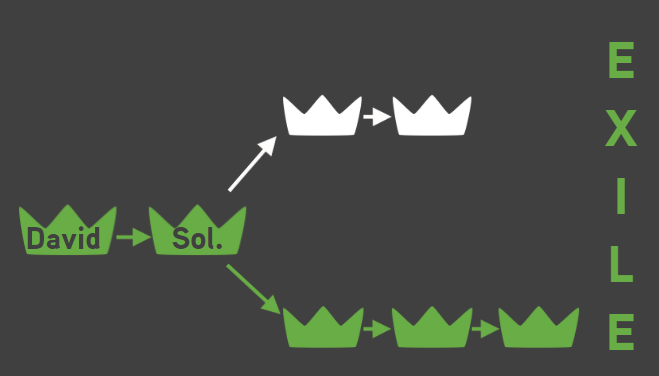
But Solomon’s sin led to the kingdom splitting – into the northern kingdom, which came to an end first; and the southern kingdom, which continued in David’s family line, but came to an end with the exile. Which begs the question: so what happened to God’s promise to David in 2 Samuel 7.16 that:
your house and your kingdom shall be made sure for ever before me. Your throne shall be established for ever.
Well the answer is: the promise went underground – a bit like the Metro goes underground from Jesmond and you don’t see it again until it comes above ground on the bridge over the river.
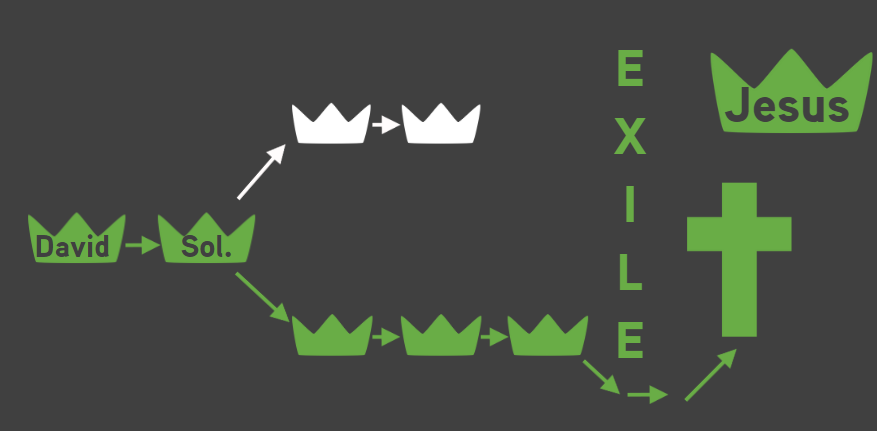
The 2 Samuel 7 promise went underground from the exile but David’s family line was still going, even if they weren’t being kings. And the promise came above ground again when, 500 years after the exile, someone was born into that family line but from outside it. Someone who wasn’t part of our sinful human race, but who was God become sinless man. Someone who could live a perfect life. Someone who could die for the forgiveness of our sins. And someone who could rise from the dead to be the king forever that David had pointed forward to. Someone called Jesus. And if you’ve understood David and his kingdom better through this series, you’ll have understood Jesus and his kingdom better, too.
